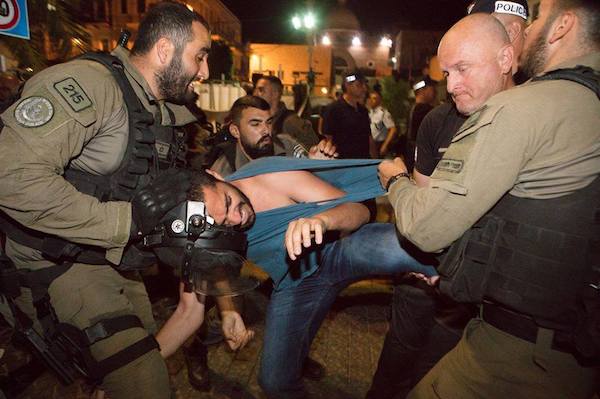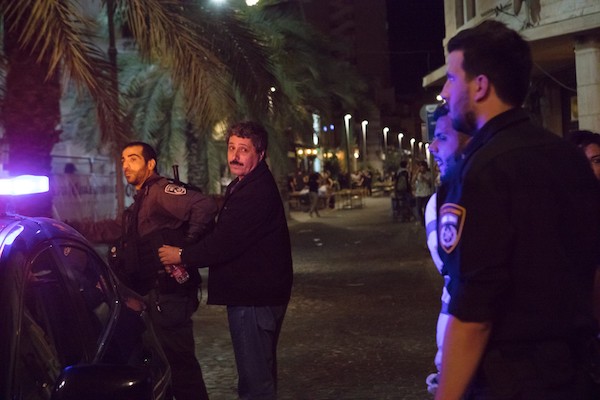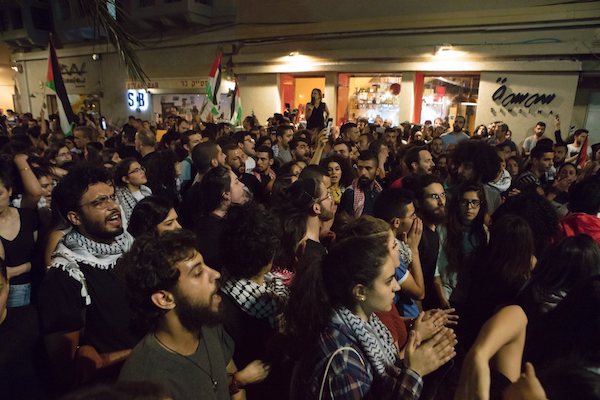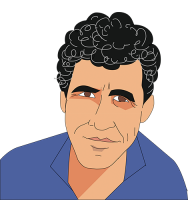Seven require medical treatment for injuries sustained during their arrests or while in custody, including Jafar Farah, who says an officer broke his knee inside the police station. Police file criminal complaint against Arab MK Ayman Odeh for calling the officers who refused to let him visit a hospitalized protester ‘losers’.

Israeli police arrested 21 people over the weekend at a protest in Haifa against the mass killing of Palestinian protesters in Gaza days earlier. Most of the 300 protesters were Palestinian citizens of Israel, although two of those arrested were Jewish Israelis.
Several of the protesters required hospitalization due to police violence, including the head of the Arab civil rights organization Mossawa, Jafar Farah, who says an officer broke his knee while he was in custody.
Officers later intimidated doctors at the Haifa hospital where he was being treated, Farah alleged, threatening the medical staff and insisting that they release him from the hospital even though he required further treatment.
After spending 48 hours in custody due to a Jewish holiday, which meant courts were closed until Sunday evening, a Haifa Magistrates’ Court judge ordered all of the detainees released on bail early Monday morning. Police had asked to keep them in custody for an additional five days.
“My son went to the protest — I raised my children to go to protests — and when I got there to look for him I realized that the place was surrounded by riot police and that it wasn’t possible to leave,” Farah said in court. “I tried to leave but a police officer wouldn’t let me. Later, when I was already two blocks away from the protest, the same officer came up to me and arrested me.”
Later that night, when he was sitting on the floor with the other detainees inside the police station, Farah said he asked one of the officers where his son was. “One of the officers inside the Haifa police station decided to strike my leg and break my knee. He kicked me.”
Photos appear to show that Farah was not injured at the time of his arrest.

At least seven of the detainees had to be brought to the hospital for medical treatment, the police prosecutor admitted in court Sunday night.
“The doctors said that I need to stay in the hospital,” Farah told the court. “[The police officers] threatened the doctors that if they don’t release me they would be summoned for interrogation — I heard it while I was shackled to the hospital bed.”
Other activists who were at the protest on Friday also described a scene in which the police descended on the peaceful gathering, trapped the protesters, and arrested them for no other reason than the fact that they were protesting.
“I found myself between two lines of police, each one pushing me toward the other and yelling at me: ‘Go! Go!’ But I didn’t have anywhere I could go,” said one protester, who asked not to be named. “They wanted to provoke us, to increase the level of violence in order to deter people from showing up to more protests.”
Another protester, Joseph Atrash, said it felt as if police had predetermined a violent outcome before the protest even began. “They were more violent than usual,” he said, adding that he believes the officers were trying to send a message.
“But we shouldn’t be surprised by police violence and this isn’t that big a story,” Atrash continued. “What are a few punches compared to the murder of children in Gaza? What’s important is that all of us in Haifa, Gaza, Ramallah or Beirut — we are one. We don’t want nicer police officers, we want the apartheid regime to end.”
According to Attorney Hassan Jabareen, the head of the legal center Adalah, who represented Farah and several of the detainees along with volunteer lawyers and the Human Rights Defenders Fund, the protest was completely legal and police had no justification for dispersing it, let alone arresting the protesters.
“The law does not require a permit for this [type of] protest,” Jabareen said on Monday after the court’s decision. “It was illegal for the police to dismantle it.”
The demonstration on Friday was the third to take place in Haifa last week, and police had already employed aggressive tactics to try to shut them down. In addition to several arrests at the protests themselves, police arrested and detained a number of Palestinian and Jewish activists in Haifa to deter them from participating in and organizing protests.

Also on Sunday, police officers at Rambam Hospital, where Farah was being treated, filed a criminal complaint against Joint List MK Ayman Odeh for calling them the Hebrew equivalent of “losers.” The officers were refusing to allow Odeh, the head of the third-largest party in the Knesset, to enter the hospital to check on Farah, and threatened to arrest him if he didn’t leave.
Public Security Minister Gilad Erdan, who is responsible for the Israel National Police, demanded that the attorney general open an investigation into Odeh for “interfering with the work of an officer, insulting a public servant, violating a lawful order, threats, and any other crimes resulting from his behavior […] that may arise during the course of an investigation into the incident and those involved in it.”
Erdan also called on the police internal affairs unit to quickly investigate Farah’s injuries.
Parts of this report first appeared in Hebrew in an article on Local Call. Read it here.


